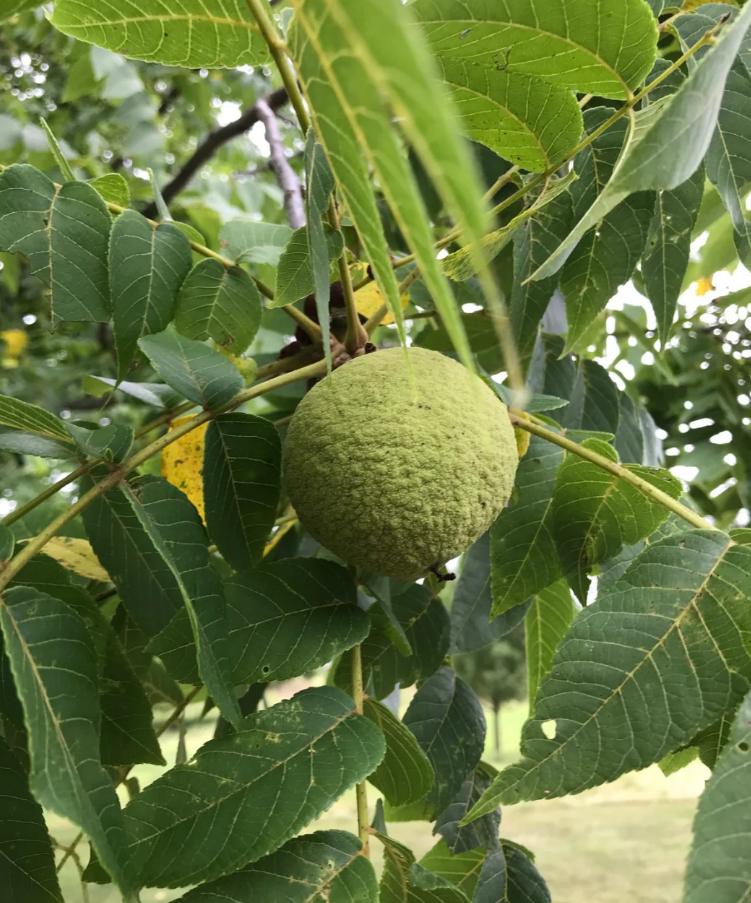Walnut, Black, Bare Root
Nut Tree for Food Forests & Timber Systems
Walnut, Black, Bare Root - Bare Root / 6-18" Seedling is backordered and will ship as soon as it is back in stock.
Delivery and Shipping
Delivery and Shipping
Make sure to thoroughly review our entire "Shipping, Returns, Refunds, and Our Guarantee" page for all relevant details about ordering from our store.
Making a purchase from our store constitutes an agreement to all the conditions outlined in those policies.
We appreciate your support and look forward to being your favorite plant provider!
Subscribe to our newsletter
Sign up for exclusive offers.
Black Walnut (Juglans nigra)
Black Walnut is a towering native hardwood known for its valuable timber, edible nuts, and strong presence in native ecosystems. Native to eastern North America, this deciduous tree supports wildlife, regenerates soil, and plays a long-term role in food forests, agroforestry, and reforestation projects. Its deeply furrowed bark, pinnate leaves, and wide-spreading canopy make it a majestic centerpiece tree for large landscapes. Black Walnut’s nuts are prized for their rich, earthy flavor—and its roots release juglone, a natural compound that can suppress some plant neighbors, making thoughtful companion planting essential.
Key Characteristics
-
Edible nuts with high nutritional value
Black Walnuts produce protein-rich nuts with a bold, distinctive flavor. Though hard to crack, they’re packed with omega-3s and antioxidants and are used in baking, sauces, or eaten raw by experienced foragers. Harvest typically occurs in fall after leaf drop. -
Supports wildlife with nuts and habitat
The nuts feed squirrels, chipmunks, foxes, and wild turkeys, while the tree provides shelter and nesting habitat for birds and small mammals. The leaf litter supports soil invertebrates, building a food web from the ground up. -
Juglone production and plant guild considerations
Black Walnut releases juglone from its roots, leaves, and husks—an allelopathic compound that inhibits many common garden plants. However, certain species like elderberry, pawpaw, and mulberry are tolerant, making this tree workable in carefully planned food forests and silvopasture systems. -
Timber and reforestation value
Black Walnut is a highly prized timber species due to its dark, dense wood. It is used in high-end furniture, cabinetry, and veneers. Planting Black Walnut in regenerative forestry projects helps sequester carbon and restore valuable long-lived canopy cover. -
Long-lived with deep roots and drought resistance
Once established, Black Walnut develops a strong taproot system, making it resilient to drought and suitable for dry-to-medium soils in open areas. It thrives in deep, well-drained soils and can live for over 150 years.
Product Details
- Native range: Eastern and Central U.S., from the Great Plains to the East Coast
- Plant life cycle: Deciduous Tree
- Sun requirements: Full sun
- Soil requirements: Medium-dry to medium; prefers deep, well-drained soils
- Mature height: 70–100+ feet
- Bloom time: Late spring
- Bloom color: Inconspicuous green catkins
- USDA Hardiness zones: 4–9
Black Walnut is a long-term investment in your landscape—offering food, timber, and wildlife habitat for generations. With the right companion species and plenty of space, it’s an ecological powerhouse for agroforestry and restoration systems.
-
Sun RequirementsFull Sun
-
Soil RequirementsMedium, Medium-Wet, Medium-Dry
-
Bloom ColorGreen, Yellow
-
Bloom TimeApril, May, June
-
USDA Hardiness ZonesZone 4, Zone 5, Zone 6, Zone 7, Zone 8, Zone 9+
-
Native StatesVermont, New York, Pennsylvania, Ohio, Indiana, Illinois, Missouri, Iowa, Kansas, Kentucky, West Virginia, Virginia, Tennessee, North Carolina, South Carolina, Georgia, Alabama, Mississippi, Arkansas, Oklahoma, Texas
Payment & Security
Payment methods
Your payment information is processed securely. We do not store credit card details nor have access to your credit card information.




